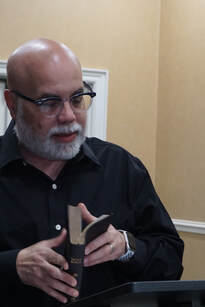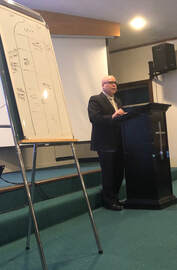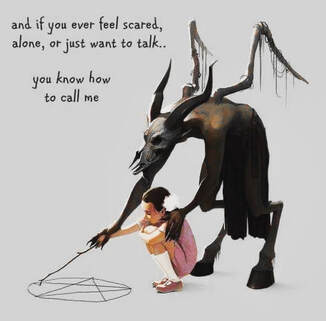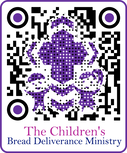|
7/18/2024 0 Comments Overcoming the Spirit of LeviathanOvercoming the Spirit of Leviathan
By Pastor Miguel Bustillos, Deliverance Minister and Exorcist The Children's Bread Deliverance Ministry Website: www.deliverancexorcisms.com In the unseen realm of spiritual warfare, one formidable adversary often mentioned is the spirit of Leviathan. Known for its cunning nature and ability to sow discord, Leviathan is a formidable foe that can cause significant disruptions in our spiritual lives. But how can we recognize its presence and, more importantly, overcome it? The spirit of Leviathan operates subtly, weaving pride, confusion, and division into the fabric of our lives and communities. It twists words, manipulates truth, and fosters misunderstandings, leading to broken relationships and spiritual stagnation. Many believers find themselves caught in cycles of conflict and frustration, unable to identify the root cause of their struggles. This spiritual blindness hinders their growth and undermines the unity and love that should characterize the body of Christ. The key to overcoming the spirit of Leviathan lies in humility, prayer, and the power of God's Word. Scripture provides numerous examples of how humility dismantles pride, one of Leviathan's primary tools. James 4:6 reminds us, "God opposes the proud but shows favor to the humble." Engaging in regular prayer and seeking God's wisdom helps us discern and dismantle the enemy's tactics. Furthermore, Ephesians 6:12-18 equips us with the armor of God, essential for standing firm against any spiritual attack. By fostering a community of transparency, accountability, and love, we can resist Leviathan's influence and restore unity. Spiritual warfare requires vigilance and a reliance on God's strength and guidance. By recognizing the signs of Leviathan's influence and actively countering it with humility, prayer, and scriptural truth, we can protect ourselves and our communities from division and confusion. Remember, victory in spiritual warfare is assured through Christ, who empowers us to overcome any adversary. Stay vigilant, stay prayerful, and walk in the unity and love that God intends for His people.
0 Comments
By Pastor Miguel Bustillos, Exorcist
website: www.deliverancexorcisms.com The concept of voodoo dolls, intertwined with practices of witchcraft and sorcery, often presents a profound challenge for Christians seeking to understand these phenomena from a Biblical perspective. This examination delves into the origins, types of magic employed with voodoo dolls, and the Biblical stance on such practices. Origins and Contemporary Use of Voodoo Dolls Voodoo dolls originate from African spiritual traditions and have been integrated into various cultural practices, most notably within Haitian Vodou. In this traditional context, voodoo dolls are used as spiritual tools for mediation between humans and the spiritual realm, often aiming for healing, guidance, or protection. However, the adaptation of voodoo dolls in popular culture and certain modern witchcraft practices sometimes portrays a darker usage, where these dolls are employed for harm or manipulation through specific types of magic. Types of Magic Employed with Voodoo Dolls 1. Sympathetic Magic: This form of magic is based on the principle that objects can be influenced through something that resembles them or has been in contact with them. In the case of voodoo dolls, practitioners often use personal artifacts like hair or pieces of clothing, believing that actions performed on the doll will directly affect the person represented. 2. Contagious Magic: A subset of sympathetic magic, contagious magic operates on the belief that things once in contact with a person can continue to affect them. Practitioners might incorporate personal items such as nails, skin, or blood into the doll, which are believed to strengthen the magical connection. 3. Spirit Invocation: This involves invoking spirits or deities to imbue the doll with certain powers. The ritual might be aimed at directing spiritual forces to carry out specific actions, like healing or hexing, through the medium of the doll. Biblical Perspective on Witchcraft and Magic The Bible provides clear directives regarding the practices of magic and witchcraft: - Old Testament Warnings: Deuteronomy 18:10-12 prohibits various forms of witchcraft and magic, labeling them as detestable to God. Such practices include divination, sorcery, and the casting of spells. - New Testament Teachings: Galatians 5:19-21 warns that those who engage in practices like witchcraft ("sorcery" in some translations) will not inherit the kingdom of God, emphasizing the spiritual danger associated with these acts. Christian Response to the Use of Voodoo Dolls For Christians, the appropriate response to the understanding and engagement with practices involving voodoo dolls includes: 1. Prayer and Spiritual Warfare: Ephesians 6:10-18 calls believers to put on the full armor of God to stand against the schemes of the devil, highlighting the importance of spiritual readiness. 2. Compassionate Outreach: Engaging lovingly with individuals involved in these practices, aiming to bring them towards the truth of the Gospel, is crucial. It involves not just correction but also providing support and guidance. 3. Education and Discernment: By becoming well-informed about these practices, Christians can better discern and educate others about the spiritual realities and dangers posed by witchcraft and similar practices. This involves promoting a Biblical understanding that emphasizes reliance on God's power and providence. Voodoo dolls, as used in various cultural and magical contexts, pose significant questions for Christians. Understanding these practices through a Biblical lens is essential for maintaining spiritual integrity and providing effective ministry in a world where such practices are sometimes glorified. The Bible's clear stance against witchcraft and sorcery directs believers towards reliance on God and the power of prayer, underscoring the importance of approaching all spiritual practices with discernment and faithfulness to Scripture. By Pastor Miguel Bustillos, Christian Exorcist
website: www.deliverancexorcisms.com Understanding Demonic Obsession: A Spiritual Battle for the Mind In the realm of spiritual warfare, demonic obsession stands out as a profound and unsettling disturbance that can ensnare individuals in a relentless grip of intrusive thoughts. This spiritual affliction involves obsessive thoughts that a person has no control over, which persistently preoccupy their mind and divert their focus from God. Here, we explore the nature of demonic obsession, its effects on the individual, and the spiritual remedies available through Christian faith. The Nature of Demonic Obsession Demonic obsession occurs when a demon or unclean spirit imposes persistent thoughts upon an individual. Unlike ordinary temptations or mental health issues, these thoughts are intensely invasive and seem to originate outside the person's control. They are typically negative, distressing, and can involve blasphemous, violent, or otherwise disturbing content. The purpose of these thoughts is clear: to disrupt the person’s relationship with God, instill fear, create confusion, and foster isolation. Symptoms and Effects The primary symptom of demonic obsession is an overwhelming flood of obsessive thoughts that dominate the individual’s mental landscape. These thoughts are not just fleeting worries; they are invasive and persistent, often causing significant anxiety and spiritual turmoil. The person may struggle to pray, read the Bible, or engage in any religious activities due to their mind being preoccupied with these tormenting thoughts. Over time, this can lead to spiritual paralysis, where the individual feels disconnected from God and unable to maintain their religious practices. The Purpose Behind the Attack The goal of demonic obsession is to keep the person's thoughts anchored in fear and away from God. By constantly bombarding them with disturbing thoughts, the demon aims to exhaust the individual's mental and spiritual defenses, making it difficult for them to seek solace in their faith or to reach out to others for help. This isolation can make the individual more vulnerable to further demonic influences or even possession. Spiritual Remedies and Protection 1. Prayer and Fasting: Engaging in prayer and fasting is a powerful way to combat demonic influences. Prayer fortifies the spirit and reestablishes the connection with God, while fasting weakens the physical attachments that might be exploited by demonic forces. 2. Scriptural Engagement: Immersing oneself in the Bible helps to reinforce God’s truth and promises, acting as a shield against the lies and deceptions of demonic forces. 3. Seeking Spiritual Direction: Consulting with a priest, pastor, or a spiritual director who is knowledgeable about spiritual warfare can provide guidance and specific prayers for deliverance. 4. Community Support: Staying connected with a faith community not only provides emotional support but also strengthens one’s spiritual life through fellowship and collective prayer. Demonic obsession is a serious spiritual affliction that targets the mental and spiritual wellbeing of individuals, aiming to sever their connection with God. Recognizing the symptoms and understanding the nature of this attack are the first steps toward seeking help and reclaiming one’s spiritual peace. Through prayer, scriptural engagement, and the support of a faith community, those afflicted can find strength and deliverance. In the Christian journey, no one needs to face these battles alone; the power of Christ and the support of the community provide a formidable defense against demonic forces. 11/9/2023 0 Comments Deliverance PrayerThe Lord said to Satan, “The Lord rebuke you, Satan! The Lord, who has chosen Jerusalem, rebuke you! Is not this man a burning stick snatched from the fire?” Zech 3:2
. Lord, how many are my foes! How many rise up against me! Many are saying of me, “God will not deliver him.” But you, Lord, are a shield around me, my glory, the One who lifts my head high. I call out to the Lord, and he answers me from his holy mountain. I lie down and sleep; I wake again, because the Lord sustains me. I will not fear though tens of thousands assail me on every side. Arise, Lord! Deliver me, my God! Strike all my enemies on the jaw; break the teeth of the wicked. From the Lord comes deliverance. May your blessing be on your people Ps. 3:1-8 In you, Lord, I have taken refuge; let me never be put to shame; deliver me in your righteousness. Turn your ear to me, come quickly to my rescue; be my rock of refuge, a strong fortress to save me. Since you are my rock and my fortress, for the sake of your name lead and guide me. Keep me free from the trap that is set for me, for you are my refuge. Into your hands I commit my spirit; deliver me, Lord, my faithful God. Ps. 31:1-5 You are my strength, I watch for you; you, God, are my fortress, my God on whom I can rely. God will go before me and will let me gloat over those who slander me. Ps. 59:9-10 Though I walk in the midst of trouble, you preserve my life. You stretch out your hand against the anger of my foes; with your right hand you save me. The Lord will vindicate me; your love, Lord, endures forever-- do not abandon the works of your hands. Ps. 138:7-9 In you, Lord, I have taken refuge; let me never be put to shame. In your righteousness, rescue me and deliver me; turn your ear to me and save me. Be my rock of refuge, to which I can always go; give the command to save me, for you are my rock and my fortress. Do not be far from me, my God; come quickly, God, to help me. May my accusers perish in shame; may those who want to harm me be covered with scorn and disgrace. As for me, I will always have hope; I will praise you more and more. My mouth will tell of your righteous deeds, of your saving acts all day long-- though I know not how to relate them all. My lips will shout for joy when I sing praise to you-- I whom you have delivered. My tongue will tell of your righteous acts all day long, for those who wanted to harm me have been put to shame and confusion. Ps. 71:1-3,12-15, 23-24 Deliver me from my enemies, O God; be my fortress against those who are attacking me. But I will sing of your strength, in the morning I will sing of your love; for you are my fortress, my refuge in times of trouble. You are my strength, I sing praise to you; you, God, are my fortress, my God on whom I can rely Ps. 59:1,161-7 Rescue me, Lord, from evildoers; protect me from the violent, who devise evil plans in their hearts and stir up war every day. They make their tongues as sharp as a serpent’s; the poison of vipers is on their lips. Keep me safe, Lord, from the hands of the wicked; protect me from the violent, who devise ways to trip my feet. The arrogant have hidden a snare for me; they have spread out the cords of their net and have set traps for me along my path. I say to the Lord, “You are my God.” Hear, Lord, my cry for mercy. Sovereign Lord, my strong deliverer, you shield my head in the day of battle. Ps.140:1-7 Be exalted, O God, above the heavens; let your glory be over all the earth. Save us and help us with your right hand, that those you love may be delivered. Give us aid against the enemy, for human help is worthless. With God we will gain the victory, and he will trample down our enemies. Ps. 108:5-6,12-13 Do not withhold your mercy from me, Lord; may your love and faithfulness always protect me. For troubles without number surround me; my sins have overtaken me, and I cannot see. They are more than the hairs of my head, and my heart fails within me. Be pleased to save me, Lord; come quickly, Lord, to help me. May all who want to take my life be put to shame and confusion; may all who desire my ruin be turned back in disgrace. May those who say to me, “Aha! Aha!” be appalled at their own shame. But may all who seek you rejoice and be glad in you; may those who long for your saving help always say, “The Lord is great!” But as for me, I am poor and needy; may the Lord think of me. You are my help and my deliverer; you are my God, do not delay. Ps. 40:11-17 Contend, Lord, with those who contend with me; fight against those who fight against me. Take up shield and armor; arise and come to my aid. Brandish spear and javelin[a] against those who pursue me. Say to me, “I am your salvation.” May those who seek my life be disgraced and put to shame; may those who plot my ruin be turned back in dismay. May they be like chaff before the wind, with the angel of the Lord driving them away; may their path be dark and slippery, with the angel of the Lord pursuing them. Since they hid their net for me without cause and without cause dug a pit for me, may ruin overtake them by surprise-- may the net they hid entangle them, may they fall into the pit, to their ruin. Then my soul will rejoice in the Lord and delight in his salvation. My whole being will exclaim, “Who is like you, Lord? You rescue the poor from those too strong for them, the poor and needy from those who rob them.” Ps. 35:1-10 10/30/2023 0 Comments Dangers of Halloween!Title: The Dangers of Halloween: A Biblical Perspective
By Pastor Miguel Bustillos Exorcist and Deliverance Minister Introduction Halloween, with its costumes, candies, and spooky decorations, has become a widely celebrated holiday in many parts of the world. However, from a biblical perspective, there are concerns about the origins and practices associated with this holiday. In this blog, we will explore the potential dangers of Halloween and how Christians can approach it in a way that aligns with their faith. 1. The Origins of Halloween Halloween, which means "All Hallows' Eve," has roots in ancient Celtic and Druidic festivals, including Samhain, a holiday marking the end of the harvest season and the beginning of winter. In these pagan traditions, it was believed that on the night of October 31st, the boundary between the living and the dead was blurred, and spirits could roam the earth. The Celtic people lit bonfires and wore costumes to ward off these spirits. As Christians, it is essential to be aware of these pagan origins and remember that our faith encourages us to avoid any practices that might involve pagan rituals or superstitions (Deuteronomy 18:10-12). 2. Dark and Occult Themes Modern Halloween celebrations often embrace dark and occult themes, including witches, vampires, zombies, and other supernatural entities. These themes can glorify elements that are contrary to Christian beliefs. The Bible advises us to focus on things that are pure, lovely, and praiseworthy (Philippians 4:8). 3. Fear and Glorification of Evil Halloween often revels in fear and the glorification of evil. While some may argue that it's all in good fun, as Christians, we are reminded in 2 Timothy 1:7 that God has not given us a spirit of fear but of power, love, and self-discipline. Fear and evil should not be celebrated or trivialized. 4. Inappropriate Costumes One common practice on Halloween is the wearing of costumes. However, some costumes can be inappropriate and even offensive. As Christians, we are called to be mindful of our choices and actions, considering whether they align with biblical principles (1 Corinthians 10:31). 5. Alternative Approaches So, what should Christians do during Halloween? Avoid the holiday altogether, but if you feel you can't, then consider these alternative approaches: a. Educational opportunities: Teach your children about the historical origins of Halloween and its pagan roots. Use this as an opportunity to share the Gospel and discuss the importance of distinguishing between good and evil. b. Prayer and discernment: Pray for wisdom and discernment in how to navigate Halloween as a Christian. Seek guidance from your church community and spiritual leaders. Conclusion While Halloween has become a popular secular holiday, it is essential for Christians to approach it with discernment and consideration of its origins and practices. By focusing on the principles of our faith, we can navigate this holiday in a way that honors God and promotes values that align with the teachings of the Bible. Ultimately, it is up to each individual and family to make informed and prayerful decisions about their involvement in Halloween festivities. For Deliverance Ministry: www.deliverancexorcisms.com 3/10/2023 0 Comments Angels in the BibleBiblical angels are spiritual beings that have fascinated believers and non-believers alike for centuries. They are mentioned frequently throughout the Bible and are often depicted as powerful and majestic creatures with wings. In this blog, we will explore the role of angels in the Bible and what we can learn from them.
The word "angel" comes from the Greek word "angelos," which means messenger. In the Bible, angels are often sent by God to deliver important messages to people. For example, in the Gospel of Luke, the angel Gabriel appears to Mary to announce that she has been chosen to bear the son of God. In the book of Revelation, an angel appears to John to reveal the future and the end of the world. Angels are also portrayed as protectors and warriors. In the book of Daniel, an angel protects Daniel from the lions in the lion's den. In the book of Exodus, an angel leads the Israelites out of Egypt and protects them from their enemies. Angels are also believed to be involved in spiritual warfare, battling against demonic forces. In addition to their protective and messenger roles, angels are also associated with worship and praise. In the book of Isaiah, angels are depicted as constantly praising God and singing his praises. In the book of Revelation, angels are depicted as surrounding the throne of God, worshipping and praising him. Biblical angels are often described as radiant, beautiful, and awe-inspiring beings. They are typically portrayed with wings, which symbolize their ability to travel quickly and to transcend the physical world. However, it is important to note that the Bible does not specify the physical appearance of angels. Instead, it emphasizes their spiritual nature and their role as messengers of God. In conclusion, Biblical angels play a significant role in the Bible and are often portrayed as messengers, protectors, warriors, and worshippers. They are spiritual beings that transcend the physical world and are involved in both the spiritual and physical realms. While their appearance may be a subject of speculation and interpretation, their role in delivering God's messages and protecting his people is clear. As believers, we can learn from the angels' obedience and devotion to God and strive to emulate their example in our own lives. We are a deliverance ministry church. For deliverance ministry and inner healing: www.deliverancexorcisms.com 2/23/2023 0 Comments Staying Away from False Teachers Pastor Miguel Bustillos, The Children's Bread Deliverance Ministry Church Pastor Miguel Bustillos, The Children's Bread Deliverance Ministry Church The Bible warns us to be cautious of false teachers and to stay away from their teachings. False teachers can lead people away from the truth of God's Word and can cause spiritual harm. In this blog, we will explore some of the reasons why we should stay away from false teachers according to the Bible. 1- False teachers distort the truth False teachers often twist and distort the truth of God's Word to fit their own agenda or beliefs. They may add or subtract from the Bible's teachings, leading people to believe things that are not true. The Bible warns us about this in 2 Peter 3:16, which says, "He [Paul] writes the same way in all his letters, speaking in them of these matters. His letters contain some things that are hard to understand, which ignorant and unstable people distort, as they do the other Scriptures, to their own destruction." 2- False teachers can lead us astray False teachers can lead us down a path that is not aligned with God's will. Jesus warns us about this in Matthew 24:11, "And many false prophets will arise and lead many astray." When we follow false teachers, we risk being led away from the truth of God's Word and away from God's plan for our lives. 3- False teachers can cause division False teachers can cause division in the church by promoting their own beliefs and causing disagreements. In Titus 3:10, Paul warns us to avoid people who cause division in the church, saying, "As for a person who stirs up division, after warning him once and then twice, have nothing more to do with him." 4- False teachers can be deceptive False teachers can appear to be good and even claim to be speaking on behalf of God, but in reality, they are deceptive. In 2 Corinthians 11:14-15, Paul warns us that Satan can disguise himself as an angel of light and that false teachers can do the same: "And no wonder, for even Satan disguises himself as an angel of light. So it is no surprise if his servants, also, disguise themselves as servants of righteousness. Their end will correspond to their deeds." In conclusion, the Bible warns us to stay away from false teachers because they distort the truth, can lead us astray, cause division, and can be deceptive. Instead, we should seek out teachers who are grounded in the truth of God's Word and who can guide us in the ways of righteousness. As the Apostle John says in 1 John 4:1, "Beloved, do not believe every spirit, but test the spirits to see whether they are from God, for many false prophets have gone out into the world." 2/18/2023 0 Comments The Importance of Forgiving Senior Pastor Miguel Bustillos of The Children's Bread Deliverance Church in Maryland Senior Pastor Miguel Bustillos of The Children's Bread Deliverance Church in Maryland Forgiveness is a vital concept in the Bible. It is mentioned over 100 times in the New Testament alone, and it is a fundamental principle that lies at the heart of Christian teachings. Forgiveness is the act of pardoning someone for a wrongdoing or an offense, and it is an essential part of living a Christian life. In this blog, we will explore what the Bible teaches about forgiveness and its importance in our lives The Meaning of Forgiveness: Forgiveness is the act of letting go of bitterness, anger, and resentment towards someone who has wronged us. It involves releasing the person from the debt they owe us and choosing not to hold their offense against them any longer. Forgiveness does not mean forgetting what the person did or excusing their behavior, but it does mean choosing to show mercy and kindness towards them. The Importance of Forgiveness Forgiveness is essential to our relationship with God and with others. In the Bible, God's forgiveness of our sins is the basis of our salvation. When we repent and turn to Him, He forgives us completely and unconditionally. In turn, we are called to forgive others as God has forgiven us. Forgiveness also brings freedom and healing to our own lives. When we hold onto anger and bitterness towards someone, it can consume us and cause us to feel stuck in the past. Forgiveness allows us to move forward and experience the peace and joy that God desires for us. Forgiveness also has the power to restore relationships. When we forgive someone who has wronged us, it can create an opportunity for reconciliation and a chance to rebuild trust and intimacy. How to Forgive: Forgiveness is not always easy, and it can be a process that takes time. However, the Bible provides guidance on how we can extend forgiveness to others. Here are some key steps: Recognize the offense - Acknowledge the hurt that has been caused and the impact it has had on your life. Choose to forgive - Decide to let go of your anger and bitterness and extend forgiveness to the person who has wronged you. Pray for the person - Ask God to bless the person who has hurt you and to give you the strength to forgive them. Take action - Extend kindness and grace towards the person, and seek reconciliation if possible. In conclusion, forgiveness is a critical component of the Christian life. It is a powerful act that brings freedom and healing to our lives, restores relationships, and reflects the mercy and grace of God. As we seek to live a life that is pleasing to God, let us strive to be people who extend forgivenes. The Children's Bread Deliverance Ministry is a deliverance church. To receive deliverance: www.deliverancexorcisms.com 2/16/2023 0 Comments Turning Away from WitchcraftIt's important to note that the Bible does not condone or promote the practice of witchcraft or any other form of sorcery or magic. The Bible makes it clear that such practices are sinful and are to be avoided.
If you or someone you know is struggling with the power of witchcraft, here are some steps you can take:
if you practiced witchcraft you are in need of deliverance. Contact us at www.deliverancexorcisms.com 4/3/2022 2 Comments Demons are not your friends?There are a lot of people out there that believe that they can control and manipulate demons to do their bidding. These people include satanist, witches, diviners, conjurers, tarot card readers and fortune tellers. Nothing can be further from the truth. In fact, we find that is often the opposite. The demon waits patiently for the perfect timing to turn against them. Demons are not to be trusted. They want to destroy you. They may act friendly at first, but when they have you, they will always show their true nature.
Many times during deliverance sessions demons have said how much they wish they could get their hands on my team members or myself. They want to kill us all. But God would not allow it. Demons hate you because you were made in God's image. There if no love in them. They are full of deception and hate. Demons are not your friends. They even hate each other. They are sadistic in nature and enjoy making people suffer. Stay away from them, and use your delegated authority to fight them off in Jesus' name. If you are in need of deliverance: Our webpage: www.deliverancexorcisms.com Email: [email protected] Facebook: www.facebook.com/deliversyou Office Phone: 240-415-9205 Rev. Miguel Bustillos For the Kingdom of Our Lord Jesus Christ. |
The Author:
Rev. Miguel Bustillos (Born-Again Christian) is currently the Senior Pastor of the Children's Bread Church. He is a graduate of The International School of Exorcism, The Advance Academy of Deliverance and Life Christian University, with an Advanced Degree in Theology. Furthermore, He has studied Demonology from many other institutions, including the International School of the Word (ISOW). In addition, he is also a graduate of the Regina Apostolorum in Rome, where he studied "The Rite of Exorcism and Deliverance". He trained with some of the world's top exorcists. He has freed hundreds of God's Children from demonic attacks and torment, in Jesus' name. Jesus gets all the glory. Rev. Miguel is a well known and highly sought after Exorcist and Deliverance Minister in the Washington DC, Maryland, and Virginia area. He was a guest speaker in 2019's International School of Exorcist convention. He received his ordination from Life Christian University. Before getting into ministry, he worked in the healthcare field for 18 years. He became a professor of healthcare at a university in Arlington Virginia and climbed through the ranks to become Program Director and finally Academic Dean. He left his position as Academic Dean to become a full-time Deliverance Minister. He holds terminal advance degrees in Business and Cardiopulmonary Sciences. Archives
July 2024
CategoriesAll 1 Peter 5:8 3 A.M. Challenge 500 Years Of Reformation 8 Lies About God That Sound Like Truth Abandonement Abortion Abusive Husband Abusive Wife Accountability Achan Adam Addicted To Social Media Adopted Advance Academy Of Deliverance African Ahab Alcoholism Alexander Pagani Alien Alien Deception Aliens Aliens Are Demons Aliens In Nevada Aliens Movie Alter Ego Alter Personalities Alters Am I Demon Possessed? Am I Saved Ancestral Dissociative Disorder Ancestral Sins Ancestral Spirits Ancestral Witchcraft Anchor Ancient Ancient Aliens Ancient Demons Anegsl In Battle Angels Angels Against Demons Angels Versus Demons Annabelle Annabelle Doll Anointed Cross Anointing Anointing Oil Apostle Apostle Miguel Bustillos Archangel MIchael Area 51 Are We In Tribulation Armed And Dangerous Armor Of God Armor Of God Against Demonic Forces Asbury Revival Asmodeus Assurance Of Salvation Astral Projecting Witches Astral Projection Astrology Astro Projecting Attacks Of The Devil Attacks On The Mind Audrey Huff Authority In Jesus' Name Authority Of The Believer Baal Baba Yaga Bad Behavior Bad Thoughts Baptism Baptism And Salvation Baptism In Ministry Bastard Behavior Modification Behavior Of Demons Behemoth Belial Best Christian Tattoos Best Deliverance Minister Best Deliverance Ministers Best Deliverance Ministry Best Exorcism Best Exorcist Best Finance Courses Online Best Halloween Costume Best Way To Kill Myself Bhudhism Bible Bible Museum Bible Reflections Bible Teachers Bible Truths BIBLE VERSES ABOUT FINANCIAL CURSES Biblical Condemnation Of Witchcraft Biblical Deliverance Biblical Deliverance Minister Biblical Living Biblical Perspective On Spiritual Spouses Biblical Prophets Biblical Protection Biblical Provision Stories Biblical Response To Witchcraft Biblical Steps To Inner Healing Biblical Teaching Biblical Teachings On Prophets Bishop Bitterness Blaspheming The Holy Spirit Blasphemous Thoughts Blessed Oil Blessing Blessings Blog Blood Curses Bloodline Blood Line Bloodline Curse Blood Line Curses Bloodline Curses Blood Sacrifice Bob Larson Bob Larson Books Bob Larson In Maryland Bob Larson Live Bob Larson Ministries Bob Larson Ministry Bob Larson YouTube Body Body Art Body Soul And Spirit Body Soul And Spirit Explained Body Soul And Spirit Simple Explanation Book Of Acts Born Again Born Again Christian Born Out Of Wedlock Break Free From Bondage Breaking A Curse Breaking A Spell Breaking Blood Sacrifices Breaking Curses Breaking Curses Of Failure Breaking Curses Of Money Breaking Financial Curses Breaking Free Breaking Freemansory Curses Breaking Freemasonry Curses Breaking Generational Curses Breaking Silver Cords Breaking Spells Breaking Spiritual Strongholds Breaking The Curses Of Finances Breaking The Financial Curse Breaking Witchcraft Breaking Witchraft Breaking Word Curses Brett Kavanaugh Broken Heart Broken Hearted Brother Carlos Oliveira Burning Man Festival Can A Christian Have A Demon Can A Christian Have Demons? Cancelling Curses Cancer Can Demons Cause Sickness Card Reading Cars CASH Casting Demons Out Casting Demons Out Of Children Casting Our Demons Casting Out Demons Casting Out Demons Casting Out Demons 2020 Casting Out Demons From Children Casting Out Demons Out Of Children Casting Out Demons Through Zoom Casting Out Devils Casting Out Financial Demons Casting Out Jezebel Casting Out Satan Casting Out Snakes Castings Out Demons Of Lust Catholic Church Catholic Deliverance Prayer Catholic Exorcism Catholic Exorcist Catholic Exorcist In DC Catholic Salvation Characteristics Of True Prophets Charlie Charlie CharlieCharlieChallenge Chastisement Chi Child Baptism Children Acting Up Children's Bad Behavior Childrens Bread Ministry Children's Deliverance Childrens Deliverance Childrens Deliverance Minister Children's Deliverance Ministry Childrens Deliverance Ministry Children's Deliverance Ministry In Maryland Children's Deliverance Ministry In Virginia Chinese Virus Choking Choking At Night Chris Lasala Christ And The Church Christian Christian Counseling Christian Counselor Christian Cousneling Christian Deliverance Christian Deliverance Maryland Christian Deliverance Minister Christian Deliverance Ministries Christian Discernement Christian Discernment Technology Christian Exorcism Christian Exorcist Christian Faith Stories Christian Financial Support Christianity Christian Life Christian Living Christian Ministry Christian Perspective On Witchcraft Christian Reflection Christian Salvation Christians Can't Have Demons Christian Symbols Of Tattoos Christian Teaching Christ Jesus Church Church Deliverance Training Churches Church Fathers Church Team Training Church Training Cleansing The Bloodline Clearing Of The Mind Clerical Shirt Codex Vaticanus Columbia S.C. Combating Seduction Confederate Flag Confederate Monuments Confusion Conjuring Coronavirus Corona Virus Coronavirus Demon Corona Virus In China Coronavirus Outbreak Corso Sull' Esorcismo E Preghiera Di Liberazione Cory Booker Counseling Course On Exorcism Courts Of Heaven Coven Attack Covid19 Covid-19 Covid-19 Vaccines Crash UFO Cross Cured For Coronavirus Curse Curse Breaking Cursed Cursed Money Cursed Object Cursed Objects Curse Of Mammon Curse Of The Bastard Curses Curses Of Trauma Curses On Children Cursing Someone Cutting Dagon Dallas Daniel Daniel 10 Daniel 4 Darkness And Light Cannot Dwell Together Dead Relatives Dealing With Covid-19 Dealing With Curses Dealing With Demons Dealing With Devils Dealing With Evil Spirits Dealing With Family Issues Dealing With Infirmity Dealing With Jezebel Dealing With Mammon Dealing With Pain Dealing With Satan Dealing With Sicknesses Dealing With Sin Dealing With The Devil Dealing With The Loss Of A Loved One Dealing With The Sick Dealing With The Spirits Causing Corona Virus Dealing With Vampires Dealing With Warlocks Dealing With Witchcraft Dealing With Witches Dealing With Witch In The Family Death Deep Pain Defeating Satan Defense Against Witches Deliverance Deliverance And Discernment Deliverance And Healing Ministries Deliverance And Inner Healing Deliverance Church Deliverance Churches Deliverance Church In Maryland Deliverance Church Near Me Deliverance Conference Deliverance For Children Deliverance From Covid-19 Deliverance From Evil Deliverance From Home Deliverance From Infirmity Deliverance From Witchcraft Deliverance In Canada Deliverance In Miami Florida Deliverance In South Carolina Deliverance In The UK Deliverance Meaning Deliverance Miniistry Deliverance Mininstry Deliverance Minister Deliverance Minister For Children Deliverance Minister In Australia Deliverance Minister In Europe Deliverance Minister In Japan Deliverance Minister In Maryland Deliverance Minister In Spain Deliverance Minister In The Philippines Deliverance Minister In The UK Deliverance Minister In The United States Of America Deliverance Minister In Virginia Deliverance Minister Near Me Deliverance Ministers Deliverance Ministries Deliverance Ministries Near Me Deliverance Ministry Deliverance Ministry Basic Training Deliverance Ministry Blog Deliverance Ministry Book Deliverance Ministry Church Deliverance Ministry For Children Deliverance Ministry For Me For Children Deliverance Ministry Guide Deliverance Ministry In Alabama Deliverance Ministry In Asia Deliverance Ministry In Australia Deliverance Ministry In California Deliverance Ministry In Canada Deliverance Ministry In China Deliverance Ministry In DC Deliverance Ministry In DC Area Deliverance Ministry In Florida Deliverance Ministry In Georgia Deliverance Ministry In Germany Deliverance Ministry In India Deliverance Ministry In Israel Deliverance Ministry In Malaysia Deliverance Ministry In Maryland Deliverance Ministry In MD Deliverance Ministry In Netherlands Deliverance Ministry In Philippines Deliverance Ministry In Rockville Maryland Deliverance Ministry In Romania Deliverance Ministry In Singapore Deliverance Ministry In South Africa Deliverance Ministry In Texas Deliverance Ministry In The UK Deliverance Ministry In The United Kingdom Deliverance Ministry In The United States Of America Deliverance Ministry In The USA Deliverance Ministry In UK Deliverance Ministry In Virginia Deliverance Ministry Is Maryland Deliverance Ministry Near Me Deliverance Ministry Prayer Deliverance Ministry School Deliverance Ministry School In UK Deliverance Ministry Tips Deliverance Ministry Training Deliverance Minster In Maryland Deliverance Pastor Deliverance Prayer Deliverance Prayers Deliverance Revival Deliverance Seminar Deliverance Seminars Deliverance Sermon Deliverance Spiritual Warfare Training Deliverance Testimonies And Stories Deliverance Training Deliverancexorcisms.com Demi Lovato Demon Demon Attacking The Mind Demon Attacks Demon Free In 2020 Demon House Demonic Assignments Demonic Attacks Demonic Attack Vulnerability Demonic Bondage Demonic Doll Demonic Influence Demonic Legal Rights Demonic Nightmares Demonic Obsession Demonic Oppression Demonic Possession Demonic Spouse Demonic Strongholds Demonic Thoughts Demonic Tongues Demonic Torment Demonic Transformation Demonization Demon Of Lust Demonologist Demonology Demon Orgasm Demon Patterns Demon Possession Demon Ranking Demons Demons And Being Born Again Demons And Money Demons Are Attacking Me Demons Are Moving In My Body Demons Are Raping Me Demons Are Tormenting Me Demons Attacking My Child Demons Attacking My Family Demons Attacking The Soul Demons Choking Me Demons Come To Me At Night Demons Following Me Demons Hate The Name Of Jesus Demons Have Sex With Me Demons In DC Demons In My Building Demons In My Dream Demons In My Dreams Demons In My Home Demons In My House Demons In My Mind Demons In My Neighborhood Demons In Tampa Florida Demons In The House Demon Slayer Demon Slayer Podcast Demon Slayers Demons Manifesting Demons Moving In My Body Demons On Children Demon Spirits Demons Rape Me Demons Raping Me Demons Sex Demons Speaking To Me Demons Taking My Money Demons Tattoo Demons Torment Me Demons Trying To Kill Me Demons When I Sleep Demons Wrapped Around My Neck Demon Tattoos Depress Depression Derek Prince Destroying A Witch Destroying Curses Destroying Fear Destroying The Kingdom Of Darkness Destroying Witchcraft Spells Devil Devils DID Difficult Demons Digital Media And Occult Discernment In Christianity Disobedience Disobedient Kids Dissociation Dissociative Identity Disorder Divination Divine Provision Divine Purpose Divorce Do Angels Protect Us Do I Have A Demon? Do I Have Demons Do I Have Demons Do I Have Demons? Double Minded Dr Bob Larson Dr. Bob Larson Dr. Bob Larson In Baltimore Dream Attacks Dream Catcher Dream Catchers Dreaming Of Sex Partners Dr Jerry Mungadze Dr. Richard Gallaghar Druid Druids Dr. Vincent Bauhaus Early Church Bishops Easter Eating In My Dream Eclipse Eclipse 2017 Electronic Witch Electronic Witchcraft Elijah Elves Emergency Deliverance Emotional Healing Emotional Pain End Days Ends Times End Times End Times Demons End Times Revival Energy Spirits English Rite Of Exorcism Enneagram Ephesians Ephesians 6:10-18 Equip Equip Churches Equip Deliverance Ministry Equip Ministries Eternal Perspective Evangelism Evangelist John Ramirez Everlasting Life Evil Children Evil Curses Exorcim Exorcism Exorcism And Prayer Of Liberation Exorcism And Psychology Exorcism Book Exorcism Expert Exorcism For Children Exorcism In Exorcism Exorcism In Maryland Exorcism In Rome Exorcism In The UK Exorcism Ministry Exorcism Of Anneliese Michel Exorcism Of Emily Rose Exorcism Prayers Exorcism Ritual Exorcism School Exorcisms For Children Exorcism Training Exorcist Exorcista En Latino America Exorcista En Sur America Exorcist And Psychology Exorcista Que Habla Espanol Exorcist Bob Larson Exorcist Book Exorcist Case Files Exorcist Convention Exorcist For Children Exorcist For Youth Exorcist In Africa Exorcist In Canada Exorcist In Europe Exorcist In Ireland Exorcist In Maryland Exorcist In My Area Exorcist In Scotland Exorcist In The Philippines Exorcist In The UK Exorcist In The United Kingdom Exorcist In The United States Exorcist In The United States Of America Exorcist In The USA Exorcist In UK Exorcist Miguel Bustillos Exorcist Near Me Exorcist Pastor Exorcist Priest Exorcist Show Exorcist Training Exorcist Training School Exorcist Uniform Experienced Exorcist Exposing The Enemy Failed Exorcism Failure Faith In Deliverance Ministry Faith In God's Provision Faith Journey Faith Over Fear Faith Walk Fallen Angel Fallen Angels False Christian False Prophet False Prophets False Teachers Familiar Spirit Familiar Spirits Familiar Spirits In My Bloodline Family Curse Famous Exorcist Fast And Fury 9 Father Amorth Father Candido Father Gabrielle Amorth Father Gary Thomas Fear Feast Of Trumpets Fighting Off Demons Financial Blessings Financial Curse Financial Curses Financial Help Financial Problems Finding Deliverance Resources Fish Tattoos Florida School Shooter Florida School Shooting Flu Forgiven Forgiveness Forgivessness Fortune Teller Fr Amorth Francis McNutt Frank Hammond Freedom From Demons Freedom Through Jesus Freemason Freemason Curses Freemasonry Freemasons Fr. Luke Clark Fruits Of The Spirit Full Immersion Baptism Galatians Generational Curse Generational Curses Generational Spirits George Floyd Getting Choke By Demons Getting Over Pain Getting Raped By Demons Getting Rid Of Demons In My Home Getting Rid Of Ghost Ghost Ghost Busters Ghost In My Building Ghost In My Home Ghost In My House Ghost In The House Ghost Sex Gifts Of The Spirit Gisele Gisele The Witch Glorification Goals For Next Year God God Meets Our Needs God's Blessings God's Care Snf Provision God's Love God's Miracles For Believers God's Provision God's Provision In Difficult Times God Supplies Gods Will God's Word Gods Word God Will Provide Gold Frankincense Myrrh Gratitude Grey Aliens Grief Guardian Angels Guardians Of God Guarding Against Witchcraft Gutenberg Press Habit Formation Halloween Hanuted House Happy Happy New Year Happy New Year 2018 Happy New Year 2019 Happy New Year 2020 Harry Porter Hate Haunted House Haunting Spirits Having Sex With Demons Having Sex With Ghost Healing Healing And Deliverance Ministry Healing Ministries Healing Ministry Healing Prayer Healing Prayers Healing Quotes Healing The Coronavirus Healing The Sick Healing Through Deliverance Ministry Hearing Voices Heaven He Is Watching Hell Hierarchy Of Demons Hinduism Holy Family Provision Holy Spirit Holy Spirit Led Deliverance Home Cleansing Homosexual Dreams Hopeless Horoscopes House Blessings House Cleasing House Exorcism House Infestation How Do Curses Work How Do I Break A Curse How Do I Know I Am Saved How Long Before Christianity Is Outlawed How To Become An Exorcist How To Break Curses How To Break Spells How To Cast Out Demons How To Cast Out Devils How To Deal With Bad Behavior How To Do An Exorcism How To Fight Witches How To Get God's Blessings How To Kill A Witch How To Kill Myself How To Prevent Demonic Attacks How To Tell If I Have A Demon How To Use The Bible To Fight Satan Human Sacrifice Hurt I Am Cursed I Am Depressed I Can't I Can't Keep My Money I Can't Pray I Can't Read My Bible Identifying False Prophets Idolatry I Failed I Have Been Cursed I Hear Voices Illness Immorality And Manipulation Incubus Indian Totem I Need An Exorcism I Need An Exorcist Iniquity Inner Healing Inner Healing Church Inner Healing Ministry Inner Healing Ministry In Maryland Inner Healing Prayer Inner Healing Prayer Training Inner Healing Therapy Inner Healing Work Inner Pain Inspired By Faith International School Of Exorcism International School Of Exorcism Convention International Society Of Deliverance Ministers Invicta Ministries Ireland Irish Exorcism Irish Exorcist Isaiah Saldivar Is Deliverance Ministry Biblically ISDM ISE Convention I See Dead People I See Demons Islam It's A Wonderful Life I've Been Cursed James River Church Janathan Edwards Jared C. Wilson Jay Bartlett Jerry Mungadze Jesus Jesus' Authority Over Demons Jesus Breaks Curses JesusChrist Jesus Christ Jesus Christ And Exorcism Jesus Christ The Exorcist Jesus Healing Jesus I Need You Jesus Is The Deliverer Jesus Name Jesus Our Saviour Jesus Saves Jesus The Exorcist Jewish People Jezebel Jezebel In District Of Columbia Jezebel In The Church Jezebel In Your Church Jezebel Spirit John 3:16 John Eckhardt John Lindell John Ramirez Johnson & Johnson John Zalvaris John Zavlaris Jonah Joshua Joy Kanye West Kentucky Colonel Kesha Kill And Destroy King David King James Bible King Saul Kundalini Las Vegas Shooting Laws Legal Rights Legal Rights Of Demons Leviathan Leviathan Shield Leviathan Spirit Liberation From Demonic Influences Lies Of The Devil Lilith Living For Christ Local Deliverance Ministry Love Lucifer Lucifer Curses Lust Magic Magi Gifts To Jesus Mammon Manifesting Manipulative Technology Marina Seren Mark Driscoll Martin Luther Mass Shootings Max Jukes Medicine Man Medicine Woman Meditation Mental Changes In Demonic Possession Mental Illness Merry Christmas Merry Christmas Wishes Mind Control Mindfulness Minister Ministering Spirits Ministry Ministry Near Me Ministry Of Exorcism Ministry Training Miracle Miracles Modern Forms Of Witchcraft Moloch Momo Money Money Problems Monsignor Stephen Rosetti Monster In My Closet Monsters Under My Bed Moral Law Mourning MPD Museum In DC Museum Of Bible Mutilation My Dolls Are Talking My Pastor Is A Witch Napoleon Hill Native American Totem Nebuchadnezzar Need Deliverance Negative Negative Thoughts Negativity Nephilim New Age New Agers New Decade New Life Ministry New Life Sanctuary New Life Sanctuary In Baltimore New Year New Year's Celebrated Nightmare Nightmares Night Paralysis Night Terrors Obedience Obedience To God Obsession Occult Occult Symbols In Media Old Hag Syndrome Old Testament Once Saved Always Saved Online Deliverance Online Deliverance Ministry Online Witchcraft Online Youth Ministry Open Doors To Demons Open Doors To Satan Operating In The Courts Of Heaven Oscars 2020 Ouija Board Out Of The Devil's Cauldron Overcoming Demonic Attacks Overcoming Doubt In Spiritual Warfare Overcoming Lilith Overcoming Lust Overcoming Sin Overcoming Spiritual Oppression Paganism Pain Parkinson Parkland Shooting Parkland Survivors Passover Past Life Past Life Experience Pastor Pastoral Counseling Pastor John Lindell Pastor Mark Driscoll Pastor Miguel Bustillos Pastor Miguel Bustillos On Witchcraft Pastor Vince Baughaus Pat Holliday Paul Paul The Exorcist Pazuzu Peace Penstilence Pentagram Pergamum Perry Stone Personal Growth Personal Values Pestilence Philippians 4:8 Philippines Exorcism Pigs In The Parlor Plagues Pledians Poltergeist Poltergeist In House Pontifical Athenaeum Regina Apostolorum Pornography Addiction Positive People Possessed Possessed Doll Powerful Angels Powerful Exorcist Powerful Prayer To Break Curses - Rent Rooms Colosseum Power Of Jesus Prayer Prayer Against Financial Hardship Prayer Against The Coronavirus Prayer Against Witches Prayer For Deliverance Prayer For Deliverance From The Demon Leviathan Prayer For Protection Against Demons Prayer Life Prayer Line Prayer Line In Maryland Prayers Against Witchcraft Prayers And Supplications Prayers Of Liberation From Demons Prayers To Break Curses Prayers To Rout Out Demons Prayer Strategy Prayer To Break Financial Curses Prayer Warriors Praying Against The Coronavirus Praying Against The Corona Virus Praying For Healing Of The Land Preventing Demonic Attacks Pride Priest Princes Of Hell Problematic Curses Profitless Work Prophecy In The Bible Prophet Prophetic Deliverance Prophetic Deliverance Ministry Prophetic Fulfillment Prophets Of Scriptures Protecting Faith Protection From Witchcraft Attacks Protection From Witches Protestant Minister Proverbs 13:20 Psalm 91 Psychiatrist Psychiatrist That Believe In Possession Psychiatry Psychics Psychologist Psychology Psychology And Deliverance Ministry Purgatory Python Quarantine Queen Jezebel QU Wave Raped By A Demon Raped By A Devil Raped By A Spirit Raped In Dreams Rapture Rapture 2017 Real Christianity Real Deliverance Ministry Real Exorcism Real Exorcisms Real Exorcist Rebecca Brown Rebellion In Children Rebellion In Spiritual Warfare Rebuke The Devil Recognizing Spiritual Attacks Reformation Reformation Day Reformation Day 2017 Reincarnation Rejection Rejection From Father Rejection From Mother Rejection From Parents Relationships Religion Religions Of The World Religious Spirits Remedy For The Coronavirus Removing Hindrances Removing Obstacles Renwick Gallery Repentance Rev Bob Larson Rev. Bob Larson Rev Bob Larson In Baltimore Rev. Darrell Hutchinson Revelation Revelation 12 Revelation 12 Sign Revelations Revival Rev Miguel Bustillos Rev. Miguel Bustillos Rite Of Exorcism Robert Henderson Roman Catholic Roman Collar Running Away From Witchcraft Sacrifice Sad Saint Michael Center In Manila Philippines Saint Michael Center Of Exorcism Saint Michael Church Saint Michael Prayer Saint Michael's Center Saint Michael The Archangel Saint Of The Day Saints Salavation Salavtion Salem Witch Museum Salvation Sanctification Satan Satanic Banks Satanic Ritual Abuse Satan In The End Times Satanist Saved Scary Movie Schizophrenia Schizophrenic School Of Deliverance Ministry School Shooting Schumann Resonance Scriptural Guidance On WItchcraft Scripture Study Sea Emperor Leviathan Seed War Seek His Guidance Seeking Deliverance Help Self Control Self Cutting Self Discipline Self Injury Self Kill Self Mutilation Self-Mutilation Self Rejection Semen When I Wake Up Serpent Serpent Spirits Servant Heart Service To God Setting The Captives Free Sex Sex Addicition Sex In Dreams Sex In My Dreams Sexual Abuse Sexual Dreams Sex With Demons Sex With Devils Sex With Satan Shadow People Shaman Shamanism Shamans Shapeshifting Sickness Side Effects Of Vaccine Sigil Sigil Tattoos Sign Of Jonah Signs And Wonders Signs Of Demonic Possession Signs Of Demonic Presence Signs Of False Prophets Signs Of Possession Silver Cords Simple Christian Tattoos Sin Sins Skulls Skype Deliverance Skype Deliverance Ministry Skype Deliverance Session Skype Exorcism Skype Exorcist Sleep Paralysis Snake Snakes In Dreams Social Media Social Media And Spiritual Deception Social Rejection Sold My Soul To The Devil Solfeggio Sons Of Sceva Sorcery Soul Soul Mate Soul Pain Soul Parts Soul Ties Soul Wound Soul Wounds Speaking Curses Speaking To Dead People Spells Spirit Spirit Guide Spirit Huisband Spirit Husband Spirit Of Lilith Spirit Of Manifestation Spirit Of Pride Spirit Of Sin Spirit Of The Occult Spirit Of Trauma Spirits In My House Spirits Of Illness Spirits Of Infirmity Spirit Spouse Spirits Responsible For Coronavirus Spiritual Spiritual Advice Spiritual Alignment Spiritual Authority Spiritual Battles Spiritual Blog Spiritual Bondage Spiritual Challenges Spiritual Cleansing Spiritual Counseling Spiritual Danger Spiritual Defenses Spiritual Deliverance Spiritual Discernment Spiritual Empowerment Spiritual Encouragement Spiritual Freedom Spiritual Growth Spiritual Growth And Freedom Spiritual Healing Spiritual Health And Freedom Spiritual Husband Spiritual Husbands Spiritual Legal Rights Spiritual Love Spiritual Oppresion Spiritual Oppression Spiritual Protection Spiritual Purity Spiritual Snakes Spiritual Spouse Spiritual Strongholds Spiritual Victory Spiritual War Spiritual Warfare Spiritual Warfare Against Family Spiritual Warfare Blog Spiritual Warfare Book Spiritual Warfare Insights Spiritual Warfare Online Spiritual Warfare Training Spiritual Warrior Spiritual Weapons Spiritual Wife Spirit Wife Split Personality Sprinkling Baptism SRA Stay At Home Steal Stephen Paddock Steps For Spiritual Protection St. Michael Center St. Michael Center For Spiritual Renewal St Michael Center Of Exorcism Stopping Attacks From Demon Stopping Curses Stopping Witchcraft Stopping Witchcraft Attacks Stopping Witches St. Paul Strengthening Faith Against Demons Stripper At Pastor's Conference Strongholds Succubus Suicidal Suicide Summoning Demons Superbowl Super Bowl Support Groups Talking To Demons Tarot Card Tarot Card Reader Tarot Cards Tattoo Tattoos TB Joshua T.B. Joshua-Pastor Teaching The Bible To Children Ted Bundy Territorial Demons Texas Thanksgiving The Advance Academy Of Exorcism The Apostles The Archangels The Bible The Biblical Order Of The Family The Blue Whale Challenge The Burning Man The Chidlren's Bread Deliverance Ministry The Children Bread Deliverance Ministry The Children's Bread Deliverance Ministry The Childrens Bread Deliverance Ministry The Children's Bread Deliverance Ministry In Maryland The Children's Bread Ministry The Childrens Bread Ministry The Christonian Church The Conjuring The Conjuring: The Devil Made Me Do It The Curse Of Illegitimacy The Demon House The Demons Slayers The Devil The Devil And Father Amorth The Devil's Cauldron The Devourer The Exorcist The Exorcist Files The Exorcist's Podcast The Flu Season The Gospel The Great American Eclipse The Lord Of Karma The Mind The Mind Is The Battlefield The Momo Challenge The Museum Of The Bible The Pope's Exorcist THE PRAYER THAT WORKS FINANCIAL MIRACLES The Rapture Therapy The Real Exorcist The Rite The Spirit Of Corona The Spirit Of Jezebel The Spirit Of Lilith The Spirit Of Mammon The Temple Renwick Gallery The Watchers The Worst Demon Things Move Around By Themselves Tithe Tom Brady Tongues Torah Torment Tormented By Demons Tormenting Demons Totem Trained Exorcist Training In Deliverance Mininstry Training In Deliverance Ministry Training In Spiritual Warfare Traits Of Jezebel Transformative Power Of Deliverance Tribulation Trick Or Treat True Christians True Prophet Trump Trust In God's Timing Trust In His Timing Twin Flame UFO Ufo News Uncurable Disease Under A Witchcraft Spell Unforgiveness Unmasking Jezebel Unmasking The Devil Unsaved Christian Vampire Vampires Vegas Massacre Vexes Virgin Mary Virtual Deliverance Session Visiting Me In My Dreams Voices Voices In My Head Voices In My Head' Voodoo Voodoo Chips VooDoo Doll Voodoo Dolls Warlock Warring Angels Washington DC Weapons Of Deliverance Wedlock Well Being Well Known Exorcist Werewolf Werewolves What Are Angels What Are The Tool Of A Deliverance Minister What Does The Bible Say About Financial Curses? What Is A Ghost? What Must I Do To Be Saved? What The Devil Does Not Want You To Know Why Do I Fail Wicker Man Wife How To Treat Your Husband Wisdom Witch Witch Comes To My Room Witchcraft Witchcraft At My Job Witchcraft Attacks Witchcraft Manipulation Witchcraft Protection Prayers Witch Cursed Me Witchdoctor Witches Witches Attacking Me Witches Cast A Spell On Me Witches In My Home Witches In The Church Witches On Halloween Witches On Hallowwen Witch Intimidation Witch Is Casting Spells Against Me Witch Of Endor Witchraft Wizards Word Blessings Word Curse Word Curses Word Of Knowledge Worldwide Deliverance Worldwide Deliverance Ministry Worship Wuhan Yahuah Yahusha Year 2020 Year 2024 Zak Baggan Zoom Deliverance Zoom Deliverance Minister Zoom Deliverance Ministry Zoom Exorcism Zoom Exorcist Zozo Zozo Demon |








 RSS Feed
RSS Feed


